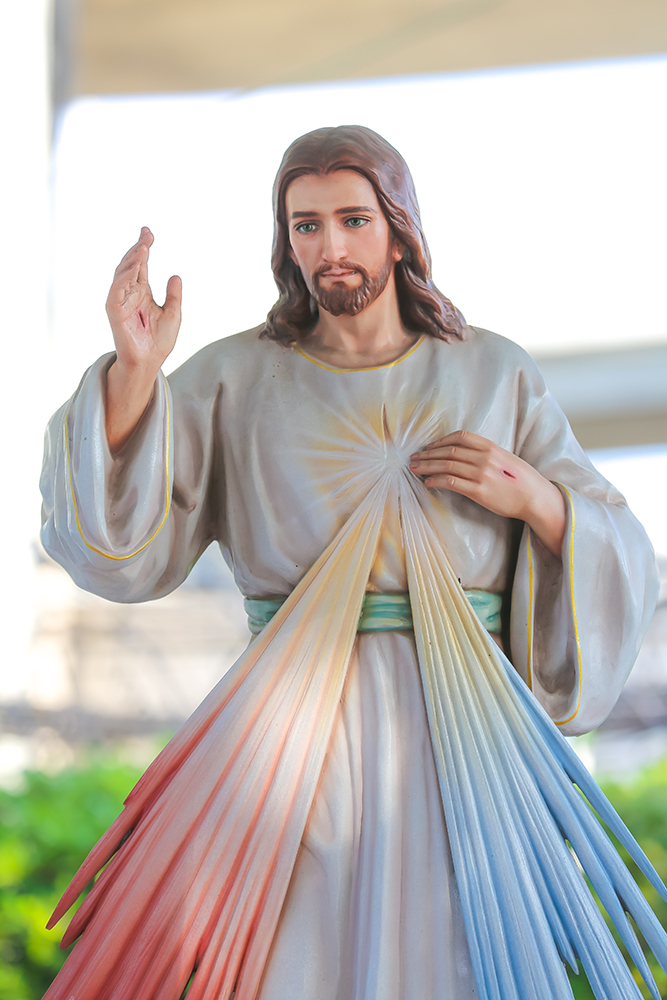St. Faunstina’s apparitions of Jesus and the chaplet he taught her in the 1930’s continue to shape the spiritual practices of countless Christians, especially during the nine days between Good Friday and Divine Mercy Sunday. While the apparitions are part of private revelation and therefore do not need to be believed or followed, in them Jesus himself drew from the Church’s pious practices and even from her liturgical prayer to shape the chaplet he gave. In particular, his inclusion of the Trisagion at the end of the chaplet provides much fodder for meditation on the Lord’s unfathomable mercy.
The Trisagion is an ancient Chrsitian hymn of triple praise to God: “Holy God, Holy Mighty One, Holy Immortal One.” Some Christians believe the prayer goes back to the Apostles themselves. Others accredit it to Nicodemus while he was assisting Joseph of Arimathea in removing Jesus’ body from the cross. Still others favor an origin story involving a levitating child and a miraculous voice from heaven around Constantinople in the early 400’s. However the prayer came to be, by the time of the Council of Chalcedon in 451, the Trisagion had become one of the exclamations of the council fathers. It is prominent in the Divine Liturgy of most Eastern Rites, being prayed just after the small entrance and before the readings from scripture. In the Latin Rite, it is featured in the Good Friday Liturgy during solemn veneration of the cross as a refrain of sorts for the Reproaches coupled with the prayer, “Have mercy on us.”
The Reproaches take their cue from Micah 6:3: “O my people, what have I done to you? In what have I wearied you? Answer me!” From there, they present a series of cruel ironies in the ways the Lord has provided for us and the ways we have rejected him. Interspersed among these couplets is the Trisagion, constantly calling our attention back to the fact that this Jesus who was crucified for our sins is the Holy One, the Mighty One, the Immortal One, who desires to have mercy on us. Beginning on Good Friday within the context of the Lord’s Passion, the Church leads us to implore his mercy. The Divine Mercy Novena takes up this cry and stretches it out, connecting the Reproaches of Good Friday with the great feast of mercy on Divine Mercy Sunday.
The Gospel reading for Divine Mercy Sunday is the culmination of this movement. John 20:19-23 recounts Jesus’ first appearance to the Apostles on Easter Sunday evening after nearly all of them abandoned him. Jesus did not yell at them or lecture them or make them feel guilty in the least about what they had done. Even though they rightly could have expected it, Jesus did not reproach them in any way. Rather, he led with peace before granting them the ability to forgive sins. Astounding! This is the reaction of the prodigal son’s father who kept his eyes on the horizon looking for an opportunity to welcome his wayward son home. It is like the shepherd who left the ninety-nine to go after the one and threw a party with his friends to celebrate its return. It’s like the widow who spent more than a coin to celebrate finding her one lost coin. God’s mercy is superfluous and sloppy, like the farmer in the parable of the sower who simply throws seed everywhere, along the path and among the weeds and in the rocky ground, and yes onto the good soil as well. Jesus’s first words to his followers who betrayed him in his time of need, men who must have felt unbearable guilt in this moment, are words of peace followed by empowerment to take away the guilt of others. Indeed his treasury of compassion is inexhaustible and his mercy is unfathomable.
We must forgive after this same pattern. Even when it is difficult and feels impossible to show mercy ourselves, we must not despair nor become despondent. Because we are beneficiaries of supernatural mercy, superfluous mercy, and even sloppy mercy, we too can and must forgive others in ways that do not make earthly sense. The Holy God, the Holy Mighty One, the Holy Immortal One had every right and reason to withhold mercy, to reproach without compassion, and yet he chose to extend peace and to give his all-too-human priests the ability to forgive the sins of others. We can avail ourselves of this mercy in the Sacrament of Confession, extend reckless mercy to others in our own lives, and remind ourselves of the inexhaustible treasury of compassion in the Divine Mercy Chaplet.






